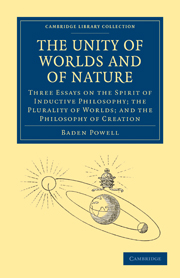 The Unity of Worlds and of Nature
The Unity of Worlds and of Nature Book contents
- Frontmatter
- PREFACE TO THE SECOND EDITION
- PREFACE TO THE FIRST EDITION
- Contents
- ESSAY I ON THE SPIRIT OF THE INDUCTIVE PHILOSOPHY
- ESSAY II ON THE UNITY OR PLURALITY OF WORLDS
- ESSAY III ON THE PHILOSOPHY OF CREATION
- INTRODUCTION: Nature of the proposed Inquiry
- I THE EVIDENCE DERIVED FROM GEOLOGY
- II THE EVIDENCE DERIVED FROM PHYSIOLOGY
- III GENERAL CONSIDERATIONS ARISING OUT OF THE PRECEDING EVIDENCE
- IV THE BEARING OF THE PRECEDING ARGUMENTS ON THE THEOLOGICAL VIEW OF CREATION
- APPENDIX
- ERRATA
I - THE EVIDENCE DERIVED FROM GEOLOGY
Published online by Cambridge University Press: 29 August 2010
- Frontmatter
- PREFACE TO THE SECOND EDITION
- PREFACE TO THE FIRST EDITION
- Contents
- ESSAY I ON THE SPIRIT OF THE INDUCTIVE PHILOSOPHY
- ESSAY II ON THE UNITY OR PLURALITY OF WORLDS
- ESSAY III ON THE PHILOSOPHY OF CREATION
- INTRODUCTION: Nature of the proposed Inquiry
- I THE EVIDENCE DERIVED FROM GEOLOGY
- II THE EVIDENCE DERIVED FROM PHYSIOLOGY
- III GENERAL CONSIDERATIONS ARISING OUT OF THE PRECEDING EVIDENCE
- IV THE BEARING OF THE PRECEDING ARGUMENTS ON THE THEOLOGICAL VIEW OF CREATION
- APPENDIX
- ERRATA
Summary
Sources of information
Fossil remains
In any question as to the origin of the world pursued on scientific grounds, the sources to which we can look for any positive or substantial information, must, in an especial degree, be those opened to us by geology and palæontology; and of some of the most material facts and admitted theoretical opinions in these departments, bearing on the question, it will be necessary to take a cursory review.
Theories of progression and non-progression
When we trace backward, by the light of fossil remains, the succession of varied forms of organised existence which have tenanted the surface of our globe during the incalculably vast periods of past time, the fact of their presenting apparently very different characters in different epochs naturally led geologists and naturalists to speculate on the question, whether those variations could be reduced to anything like a determinate order or law of succession; and probably the most prevalent opinion has been that, at least in a general sense, there has been a succession in the order of progress or advance from lower and more simple, towards higher and more complex forms of structure and function.
More recently, however, this has been much disputed. Not only have particular instances, supposed to invalidate this law, been brought forward as demanding certain modifications in the statement of it, but the entire principle has been contested and positively denied.
- Type
- Chapter
- Information
- The Unity of Worlds and of NatureThree Essays on the Spirit of Inductive Philosophy; the Plurality of Worlds; and the Philosophy of Creation, pp. 337 - 379Publisher: Cambridge University PressPrint publication year: 2009First published in: 1856
